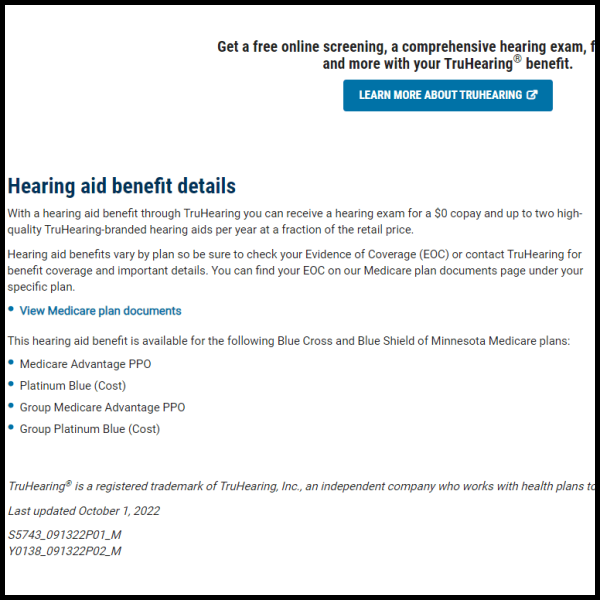

TruHearing, as a managed care provider, collaborates with insurance companies and hearing aid manufacturers to offer discounted hearing aids. With the TruHearing insurance “benefit” prices are touted to be 30-60% lower than retail. Their aim is to make hearing care more affordable. However, the company’s corporate ownership under WS Audiology, one of the largest hearing aid conglomerates globally, introduces complexities that might compromise the customer’s experience.
TruHearing appears to address financial barriers in the hearing care landscape. Positioning itself as a solution to the high cost of hearing aids. However, a closer examination reveals concerns about its impact on customers and hearing care providers. As well as the creation of monopolies and the displacement of competition affecting small local businesses. This article explores the apparent TruHearing insurance benefit that is promoted. It will also delve into why these initiatives might have unintended negative consequences for consumers.
Originally founded to combat the high cost of hearing aids, TruHearing now operates as a middleman. Purchasing hearing aids in bulk from manufacturers owned by WS Audiology. Despite the purported affordability, TruHearing’s role in the distribution chain raises questions about whether it genuinely addresses the root issue of expensive hearing aids. Or merely introduces a layer of price control.
While TruHearing maintains a fair rating on Facebook, Yelp, and Google, personal reviews reveal a more nuanced narrative. Customers express dissatisfaction with the confusion of where to go and how far they have to drive to find a TruHearing insurance benefit provider. They also note the lack of quality care, best fitting practices, other solutions than hearing aids, information and education on such simple tasks on cleaning their hearing aids and even how to use Bluetooth and apps.
There is a lack of transparency, limited choices, and the binding contract obligations imposed on healthcare providers. This results in the hearing care provider having few incentives to provide top-notch care and experience. The absence of a real choice for the consumer and potential bait-and-switch scenarios contribute to a less-than-ideal experience for those seeking hearing aids through TruHearing.
Critics argue that TruHearing’s business practices contribute to the lack of autonomy of the hearing care professionals. Potentially jeopardizing the autonomy of small businesses also. The restrictive contract terms and limitations on service fees may lead to a decline in the number of audiologists entering the field, independent practices, and job growth and opportunity. Posing a threat to the diversity and accessibility of hearing care services.
TruHearing, established in 2003 to address the high cost of hearing aids, has undergone a series of mergers and acquisitions. As of now, it operates under the corporate ownership of WS Audiology. WSA is a major hearing aid conglomerate globally recognized for brands such as Rexton, Signia, Widex, Sivantos Group, HearUSA, Audibene, and Hear.com. Functioning as an arm of WS Audiology, TruHearing endeavors to make those hearing aid brands more accessible to consumers at a slightly reduced price. This involves procuring hearing aids in bulk from manufacturers and subsequently collaborating with major health insurance companies and audiology clinics to facilitate their resale to consumers.
TruHearing’s role in the industry, along with other managed care companies, is strengthening the vertical chains of one conglomerate. Hence promoting monopolies. This trend raises ethical concerns about patient choice, transparency, and potential influence on political elections by creating a misleading perception of Medicare benefits.
In the hearing aid world, the specter of a monopoly looms as certain players consolidate power and influence. Potentially altering the landscape of the industry. A monopoly, in this context, would entail the dominance of a single entity or a select few in controlling significant aspects of the hearing aid market. From manufacturing and distribution to service provision. As evidenced by the mention of managed care providers like TruHearing, there is concern that a handful of companies may wield disproportionate control over the entire ecosystem.
Furthermore, a hearing aid monopoly may manifest through vertical integration. Where a single entity controls various supply chain stages. For instance, if a company owns both hearing aid manufacturers and manages the distribution channels, it can wield significant influence over pricing. Potentially limiting affordability and consumer choices. The integration of manufacturing, distribution, and service provision under a single umbrella could create barriers for smaller players. Hindering innovation and diversity in the market.
The emergence of a hearing aid monopoly also poses a substantial threat to privatly owned clinical practices in the field. Because most audiologists are women, this affects women owned businesses. Which also poses potentially detrimental consequences for people with hearing loss. As larger entities or conglomerates exert control over various aspects of the hearing aid market, smaller, independent audiology practices may face increased challenges in maintaining autonomy and to compete. The monopolistic environment could result in stringent contractual agreements. Limiting the flexibility of private practices to set their service fees, offer diverse product options, and maintain a patient-centric approach.
Moreover, the potential consolidation of power may lead to decreased competition. Hindering innovation and the adoption of cutting-edge technologies within private practices. Ultimately, the erosion of independent practices could lead to a reduction in personalized care, diminished transparency, and potentially higher costs for customers. The monopolistic influence may compromise the diverse and patient-focused services that private practices often provide. Undermining the overall quality and accessibility of hearing healthcare for consumers.
In essence, a hearing aid monopoly raises alarm bells not only for the industry’s stakeholders but also for consumers who rely on diverse options and fair practices. The potential consequences include restricted choices, limited access to innovative technologies, and a market environment that prioritizes the interests of a few over the well-being of those with hearing care needs. Efforts to ensure transparency, promote fair competition, and safeguard consumer choice become crucial in preventing the emergence of monopolistic tendencies within the hearing aid sector.
The potential negative impact on consumer welfare is a significant concern within the context of a hearing aid monopoly. If a dominant player or a small group of entities controls pricing, service fees, and accessibility, consumers may find themselves with fewer options, reduced transparency, and potentially higher costs. This concentration of power may also lead to limited innovation. As the monopolistic entity may have less incentive to invest in research and development when faced with minimal competition.
People frequently encounter misleading marketing tactics from Medicare Advantage plans such as TruHearing. Leading them to believe that certain benefits are covered by original Medicare. This confusion becomes especially apparent when one political party advocates for a benefit that, in reality, isn’t covered by Medicare when people think it is. While the opposing party on the other hand, emphasizes cost-cutting measures making sure that hearing aids, in this instance, are not covered.
Individuals need to grasp the nuances of the political landscape surrounding healthcare policies. Especially in the context of hearing healthcare, to avoid being misled. Awareness of the disparities between proposed benefits and the actual coverage provided by Medicare can empower individuals to make informed decisions about their healthcare. Ensuring they are not swayed by political rhetoric or misconceptions perpetuated by marketing strategies. In navigating the complex intersection of politics and healthcare, a well-informed public is better equipped to advocate for policies that align with their needs and make decisions that prioritize their overall well-being.
As the industry grapples with these challenges, advocates call for increased transparency, patient choice, and ethical practices. States like Illinois, New Hampshire, and Connecticut have taken steps towards a monetary hearing aid benefit for those over 65. Similar to the Federal benefit, it would offer a $2500 per ear every 5 years to ensure a more patient-centric approach.
People should question their insurance provider before utilizing their supposed hearing aid benefits and their low $699 or $999 “co-pays”. Despite the affordability claims made by entities like TruHearing, it is crucial to understand such organizations are not insurance companies. This fact is indicated in the fine print on the TruHearing website.
While cost considerations are important, a comprehensive and transparent understanding of the benefits, coverage, and potential limitations of these programs is essential. A real insurance benefit, coupled with services covered by insurance and fair pricing models for private audiologists, could create a more equitable landscape. This approach ensures accessibility to affordable hearing aids while supporting independent audiologists who may not purchase in bulk and may struggle to compete within the current framework. Education empowers individuals to make informed decisions that align with their needs. Promoting a healthcare system that genuinely serves the best interests of consumers and providers alike.
We extend our sincere gratitude to all readers who have engaged with this article. A special appreciation goes out to those who champion and support local businesses, such as ours. Recognizing that paying a little more money can translate into superior service and personalized attention. Especially in the realm of hearing healthcare, is a commendable stance. Your commitment to understanding the nuances of your care and supporting local clinics contributes to the vitality of communities and fosters a more robust, customer-focused marketplace.
If you’re intrigued and wish to delve deeper into this topic, we welcome further discussion. Thank you for undertaking research and making informed decisions about your hearing needs in a landscape where these considerations are becoming increasingly vital.
Here’s to a well-informed and empowered community – cheers!
Powered By SinglerDesign.com